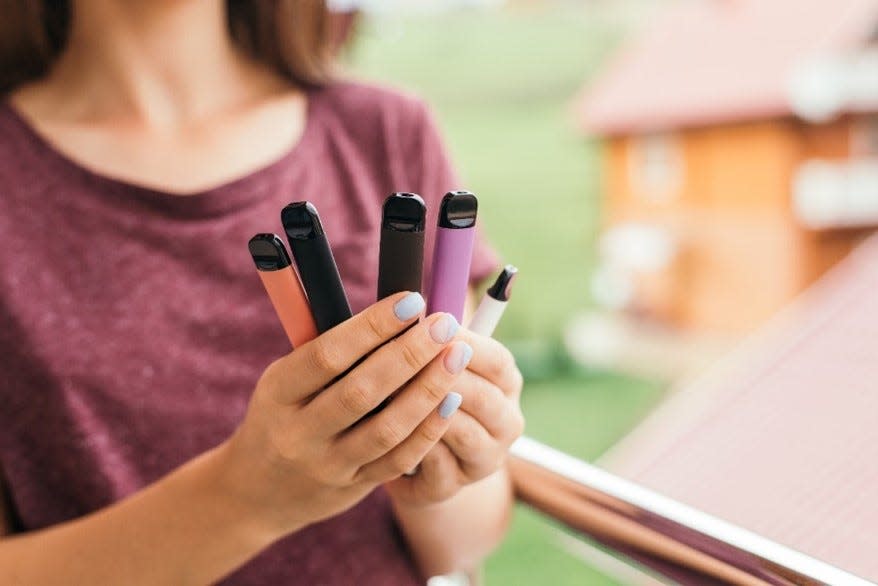Four years after ban, illegal vaping products continue to reach NJ teens
- Oops!Something went wrong.Please try again later.
Thousands of illegal vaping products imported from abroad are being sold in New Jersey to teens despite a state ban enacted four years ago that tried to curb the highly addictive habit, a group of experts told state legislators Monday.
The testimony by former law enforcement officials came just before an Assembly committee approved three bills to help crack down on illegal sales. The bills are meant to put some teeth into a law signed by Gov. Phil Murphy in 2020 that made New Jersey the first state to ban flavored vaping liquids that are especially popular among young people.
Vaping was originally meant to be a less harmful alternative to cigarette smoking that let users still get the nicotine they craved into their systems without the toxic chemicals associated with burning tobacco.

But marketing and advertising campaigns by some of the biggest companies such as Juul targeted young people by offering vaping as a cool and safe activity. The result has been “an epidemic” of vaping among teens and even younger children who become addicted to nicotine, experts say.
NJ adolescents vape far more than they smoke cigarettes
A survey of more than 4,000 New Jersey adolescents found that 25% were vaping — far outpacing cigarette smoking, according to a 2020 study. Like many states, New Jersey made it illegal to sell vaping products to anyone under 21 and then went a step further by banning flavored vape juice. But the laws did little to curb the problem, experts told the panel.
“We are seeing an increase in young people in the prepubescent ages who are becoming addicted to vaping who may never become addicted to smoking at an alarming rate,” said Tom Collins, a retired Camden police officer who educates law enforcement on vaping.
Emergency room visits nationwide for vaping peaked in 2019 and have declined, said the Centers for Disease Control and Prevention. Excess nicotine can harm brain development, and inhaling the vapors can swell and irritate the lungs.
Illegal imports from China and the Middle East
Only 23 e-cigarette and vaping products have been authorized to be sold in the U.S. by the federal Food and Drug Administration. But there are thousands of products available in retail and online shops, said Charlie Giblin, a retired criminal investigator supervisor with the state Department of the Treasury, which regulates vaping and tobacco products.
Most are illegally imported from China and the Middle East to bulk mail facilities and airports. “Many have dangerous contaminants because they are manufactured in the most incredibly unsanitary conditions,” Giblin said. “They can have the wrong nicotine level based on what’s put on the packaging.”
Of the three bills approved by the committee Monday, two deal directly with enforcement and penalties. One bill, A2388, would require vape retailers to be inspected at least twice every year to see if they are selling illegal products. There were 2,528 tobacco retailers in New Jersey as of 2020, said the state Office of Legislative Services.
Another bill, A3992, would double the penalties for selling vaping products to anyone under 21 to $500 for the first penalty, $1,000 for the second and $2,000 for every subsequent penalty.
A third bill requires the state Departments of Health and Education to develop and distribute anti-vaping materials to schools. The bills need to be passed by the full Assembly and the state Senate and signed by Murphy before they become law.
Assemblywoman Shanique Speight, D-Essex, said it is very easy for a teen to conceal that they are vaping. She found out that her daughter was vaping a few years ago by looking at her child’s smartphone and seeing selfies. The daughter had been vaping for almost a year, but has since said she has stopped.
“As a parent you think you know everything, and you don’t know what’s going on,” Speight said.
This article originally appeared on NorthJersey.com: Illegal vape products still reach NJ teens 4 years after ban

